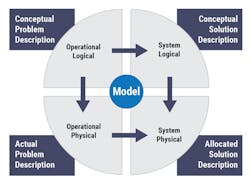Model-based systems engineering (MBSE) enhances digital design of military communications and weapons
By Dan Reineke
CHANTILLY, Va. – Amid rising geopolitical tensions, supply chain challenges, and calls to improve financial management, the defense sector is facing an urgent need to improve operational efficiency.
As defense and intelligence agencies work to develop mission-critical technologies and machinery, they can save valuable time, funding, and materials with model-based systems engineering (MBSE).
The benefits of MBSE are immense, and as such, the practice is increasingly a requirement for new defense systems contracts.
The defense industry historically has used traditional systems engineering, such as document-centric systems engineering, to specify and design weapons, satellites, and communications systems.
However, modern defense systems increasingly are becoming complex and budget-constrained, so demands improved operational efficiency. Managing the system life cycle through documents makes this harder to achieve. MBSE is a viable option for agencies to develop advanced defense systems rapidly, affordably, and collaboratively.
What is model-based systems engineering?
MBSE uses digital models to specify and design complex systems by creating a digital representation of the systems behavior, structure, and requirements. Users then can simulate the models to test different scenarios before physically building the system. This can result in reduced risk of system rework after the system is developed.
With MBSE, systems engineers can identify issues promptly, reduce overall risk, foster remote collaboration, and generate valuable data insights to inform future requirements and tests. These data insights can be tracked over time to monitor progress. As a result, defense agencies save critical funding and time, efficiency improves, and the systems produced are high-quality.
It’s nearly impossible to remove all risks when testing advanced defense systems. However, MBSE can dramatically reduce the likelihood of failure or error by identifying any issues or missing components early in the design process. By incorporating a risk management plug-in, which is a tool to track and communicate project risks, engineering teams can make informed decisions based on potential adverse outcomes.
Benefits beyond the digital — MBSE fosters interoperability
When applied correctly, MBSE significantly improves communications across disparate teams. It empowers developers, engineers, program managers and other stakeholders to understand the system’s components, and how they will interact to achieve the desired purpose of the overall system. The iterative nature of testing, which would be extremely arduous if the system had to be passed from one team to the next, can instead occur in rapid succession with a digital model.
Artificial intelligence (AI) will become a critical force multiplier for MBSE. AI tools can be used to automatically correct or populate the digital models, which will speed system development even further. Notably, it’s essential that any AI models be based on accurate and well-organized data. The security of an AI system is paramount, and when deployed responsibly this technology will drastically improve the efficiency and capabilities of current MBSE.
For defense agencies that are already resource-constrained, it can be intimidating to learn how to create a digital simulation to utilize MBSE. With the help of trusted and experienced industry partners, the benefits of MBSE can be realized without requiring defense agency employees to create the digital model themselves. The challenges facing the nation’s defense and intelligence agencies are daunting, but the advantages of MBSE can ensure the time, funding, and staff available operate as efficiently as possible to get cutting-edge systems into the hands of American warfighters as quickly as possible.
Dan Reineke is president and general manager of Strategic Technology Consulting, an Arcfield company in Chantilly, Va.
